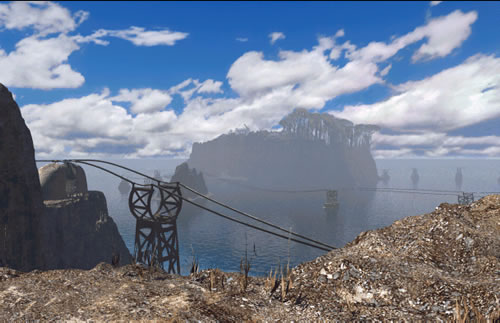exploring game worlds and eden as a video game

This may be obvious, but I think the difference between how we experience a beautiful computer game, (Indiana Jones and the Fate of Atlantis or Riven for example) and the way we experience our world is the relationship we have to that world. The artificial world does not have all the responsibilities that the real one does, and perhaps the newness of the format makes me see it with new eyes. Because I see a videogame as crafted, I notice and marvel at the craft.
Or is it the distance that makes it so attractive? It is that way to some degree with paintings, photos or the grass on the otherside of the fence. Is it the absence of me? Perhaps my driving force is just trying to get to a place free of me. But what is it about game worlds that is so attractive to me? In exploring abandoned buildings I get some of the same feeling. The desire to explore. What is it about horizons that so attracts us?
Relevant texts:
my post on kierkegaard and our relation to nature
C.S. Lewis' Pilgrim's Regress.
John Howe's blog post on Wanderlust
What about drawing? Does that help me get that feeling in the real world? Maybe
Or Photography? Yes and No.
Did Eden feel like an adventure game to Adam? Did life feel like a game? Was there play before the fall?
In many ways the world was like a game. Adam suddenly existed fully formed in a new world teaming with life. I suppose he had no memory. He did not yet know how this world, this life, worked, and what he was supposed to do. What the objective was. But then he was told. It became multiplayer. He got started, and then a things went south. But the games objectives didn't change. It became more complicated, but the rules and ultimate task are the same for us.
Labels: aesthetics, beauty, game design, kierkegaard, strangeness

1 Comments:
I think there's an important concept from Russian (structuralist?) literary criticism.
Normally, the theory claims, we do not see the world--we recognize it. That is, we look at things but then stick them into convienent categories generally on the level of use.
Poetry (and, by extension, art) has in some ways the ability to make us see things--to describe them precisely, powerfully, and unexpectedly so that we are forced to percieve something we normally wouldn't. I think the poem "Pretty" by Stevie Smith largely does this, but also Aragorn's comment that "the green grass is a great matter of legend, though you walk on it under the light of day."
But I think either way you look at it, it underlines the importance of excess and difference in art. The point of art is that it is not practical--so when one looks at a beautiful game (such as Riven) one sees how beautiful nature can be, rather than seeing a place where you have to do stuff.
Maybe exploration plays in because you don't know the purpose; and therefore are dealing with creations themselves?
Post a Comment
<< Home